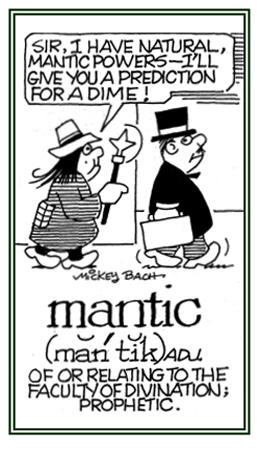-mancy, -mancer, -mantic, -mantical
(Greek: used as a suffix; divination, prophecy, fortune telling; to interpret signs so “practical” decisions can be made [related to -mania])
It isn't so much the things we don't know that gets us into trouble. It's the things we know that aren't so.
If you keep on saying things are going to be bad, you have a good chance of being a prophet.
Divination by the observation of words and discourse; with the use of magic words: Janice was convinced that she could foretell the future with logomancy by the choice of terns expressions, and the way a person talked.
A prediction of the future with flames of three identical candles arranged in a triangle: Success with the method of lychnomancy was indicated by one flame burning brighter than the other two, while a wavering flame indicated travel. Q spiral flame meant plots by enemies and an uneven flame presaged danger. Sparks called for caution and a sudden extinction indicated severe loss or tragedy for the consultant or others involved in that particular divination.
The use of knives, daggers, or swords as instruments of divination: Macharomancy was a favorite divination in Scotland and was observed on July 31st. It was thought to predict the deaths and weddings in the year to follow.
Macharomancy is thought to be of ancient origin.
Divination with the largest thing at hand or nearby: Jack wondered it he used the biggest object in his room,like his bed, he could foretell the future by the system of macromancy
Divination or fortune-telling that is based on the stains or spots on a client or on something which belongs to the client: Jane used maculomancy in an effort to determine the future life of her customer.
Divination with magic or astrology: Mary loved the stars and was sure that she could prophesy the future with the method of magastromancy and by supernatural means.
mantic (adjective), more mantic, most mantic
A reference to a person who divines and/or makes prophecies: Eve is someone who is blessed with mantic powers.

© ALL rights are reserved.
Go to this Word A Day Revisited Index

Go to this Word A Day Revisited Index
so you can see more of Mickey Bach's cartoons.
The art of divination and prophecy: Leah took a course in manticism at the local college in order to learn about the history of different systems and methods of predicting the future.
Someone who tells fortunes; a divinator; a diviner,: Mrs. Smith was known to be a mantologist, and many people in her town came to see her regarding their future lives.
Rare, the art of fortune-telling or divining past, present, and/or future events: Alice finally found a book on mantology in order to prepare a report about the soothsayings, divinations, oracles, etc. in the history of Europe.
If those who can foretell the future
Happen to be professors,
They're called "prescient prognosticators,"
If not, they're just "lucky guessers."
Happen to be professors,
They're called "prescient prognosticators,"
If not, they're just "lucky guessers."
1. Divination with pearls, usually by either casting pearls or studying pearls in oysters: One ancient use of margaritomancy involved throwing a pearl into a cast iron pot sitting in a fire and watching it to determine a person's guilt or innocence in a crime. If the pearl started to move, then the person was believed to be guilty. If it stayed in place, then he or she was not guilty.
2. Etymology: from the Latin margarita, "pearl".
2. Etymology: from the Latin margarita, "pearl".
Divination by counting; enumeration of predetermined objects: In order to prophesy the grade on her geometry test, Nancy used the method of mathemancy by gathered up all the buttons she could find and totalled them up to find the answer to her question.
1. Divination or predicting the future while observing babies when they are nursing: By the way of mazomancy Lucy's mother watched her infant while nursing her to see if she was going to grow up tall, be smart, and beautiful.
2. Etymology: from the Greek mazos, "breast" and manteia, "prophecy".
2. Etymology: from the Greek mazos, "breast" and manteia, "prophecy".
Divination with the use of sleep: Sometimes meconomancy was performed with opium, or sleep was induced with other drugs, and the effects were observed and interpreted while a person was slumbering or dozing.
Divination by observing thunder, lightning, weather, meteors, shooting stars, etc.: Meteormancy involves the scrutinizing of all kinds of the weather, like the planets, the bolts of lightning, the cracking and the rolling of thunder, etc.
Cross references of word families that are related directly, or indirectly, to: "divination, diviner; seer, soothsayer, prophecy, prophesy, prophet": augur-; auspic-; fa-, fate; Fates in action; futur-; omen; -phemia; sorc-, sorcery; vati-.
A cross reference of other word family units that are related directly, or indirectly, to: "chance, luck, fate": aleato-; auspic-; cad-; fortu-; serendipity; sorc; temer-; tycho-.


